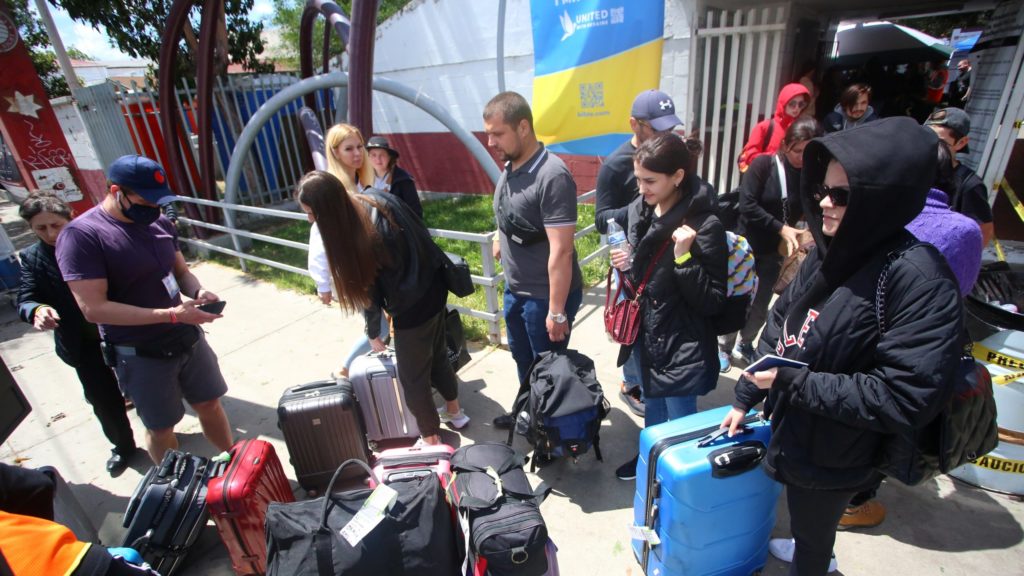Thousands of Ukrainians who fled their nation in the first days of Russia's full-scale invasion in 2022 can now apply to extend their stay in the U.S. by one year.
On March 13, the U.S. Department of Homeland Security (DHS) announced it would begin considering extensions, on a case-by-case basis, for Ukrainian nationals and immediate family members who entered the U.S. prior to the federal government's Uniting for Ukraine program.
Launched in April 2022, the Uniting for Ukraine program granted eligible applicants up to two years of humanitarian parole, enabling them to enter the U.S. and apply for employment authorization. Program applicants are required to have a financial supporter in the U.S., complete vaccinations and other public health requirements; obtain biometric, biographic and security checks; and fund their own commercial travel to the U.S. To date, more than 118,000 Ukrainians have entered the U.S. through the Uniting for Ukraine program.
However, Ukrainians who fled to the U.S. between Feb. 24, 2022, and the Uniting for Ukraine program start date had only been granted one year of humanitarian parole. The DHS extension aligns both groups, and the agency expects the extension vetting process to take approximately four weeks.
A DHS spokesperson in a written statement told OSV News the department has assessed, given the ongoing war, "there remain urgent humanitarian reasons, as well as a significant public benefit, for extending the parole of certain Ukrainians and family members on a case-by-case basis."
The statement also noted that the covered Ukrainians "may pursue multiple immigration pathways at the same time." The extension process does not impact other benefit requests, "including for those who have applied for Temporary Protected Status (TPS), been granted TPS, or applied for asylum," said the agency.
According to the United Nations High Commissioner for Refugees, an estimated 8 million Ukrainians have become refugees following Russia's full-scale invasion, while close to 6 million Ukrainians have been internally displaced. Some 17.6 million Ukrainians are in need of humanitarian assistance.
Metropolitan Archbishop Borys Gudziak of Philadelphia, head of the Ukrainian Catholic Church in the U.S., welcomed the extension.
"Most refugees do indeed want to return to Ukraine. They love their country, their people, their culture," he told OSV News. "(But) some people don't have anything to go back to. Their towns and their cities have been destroyed. Others have children already traumatized by the brutality of the war, and they want to wait it out until the victory of God's truth (in Ukraine)."
Father Ostap Mykytchyn of St. Michael the Archangel Ukrainian Catholic Church in Jenkintown, Pennsylvania, told OSV News that refugee children from one family in Kyiv, whose house was bombed by Russian troops, "can't sleep in pajamas; they sleep in coats because of the trauma. They wait for the bombs."
Refugees also are grappling with family separation, said Father Mykytchyn. "Many, many women are here with their kids, without their husbands, who because of the war can't leave the country," he said. "This is a very difficult, emotional moment for them."
On arriving in the U.S., refugees' lives are "complicated," Father Mykytchyn said. "Because of the huge numbers of refugees, it's hard (for them) to find a job."
Language barriers and dependence upon sponsors (usually family members or friends) for transportation -- particularly in suburban areas like Jenkintown, which lacks a robust public transit system -- can pose additional challenges, he said.
"They depend on their (sponsoring) relatives because they don't have their own car, so when the relatives aren't able to come to church, they also can't come," he said.
Yet amid the heartache and hurdles, Ukrainian refugees at St. Michael have still been "very active in parish life and in Ukrainian community life," said Father Mykytchyn, adding he was grateful for U.S. support of Ukraine.
"America is, I think, our closest friend in this war," he said.

